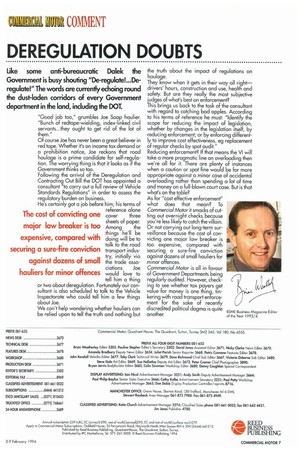DEREGULATION DOUBTS
Page 9

If you've noticed an error in this article please click here to report it so we can fix it.
Like some anti-bureaucratic Dalek the Government is busy shouting "De-regulatel...Deregulate!" The words are currently echoing round the dust-laden corridors of every Government department in the land, including the DOT.
"Good job too," grumbles Joe Soap haulier. "Bunch of redtape-wielding, index-linked civil servants...they ought to get rid of the lot of them."
Of course Joe has never been a great believer in red tape. Whether it's an income tax demand or a prohibition notice, Joe reckons that road haulage is a prime candidate for self-regulation. The worrying thing is that it looks as if the Government thinks so too.
Following the arrival of the Deregulation and Contracting Out Bill the DOT has appointed a consultant "to carry out a full review of Vehicle Standards Regulations" in order to assess the regulatory burden on business. He's certainly got a job before him; his terms of reference alone cover three sheets of paper. Among the things he'll be doing will be to talk to the road transport industry, initially via the trade asso ciations. Joe would love to tell him a thing or two about deregulation. Fortunately our consultant is also scheduled to talk to the Vehicle Inspectorate who could tell him a few things about Joe.
We can't help wondering whether hauliers can be relied upon to tell the truth and nothing but the truth about the impact of regulations on haulage. They know when it gets in their way all right— drivers' hours, construction and use, health and safety. But are they really the most subjective judges of what's best on enforcement? This brings us back to the task of the consultant with regard to catching bad apples. According to his terms of reference he must: "Identify the scope for reducing the impact of legislation, whether by changes in the legislation itself, by reducing enforcement; or by enforcing different ly to improve cost effectiveness, eg replacement of regular checks by spot audit." Reducing enforcement? If that means the VI will take a more pragmatic line on overloading then we're all for it. There are plenty of instances when a caution or spot fine would be far more appropriate against a minor case of accidental overloading rather than spending a lot of time and money on a full-blown court case. But is that what's on the table?
As for "cost effective enforcement" what does that mean? To Commercial Motor it smacks of cutting out overnight checks because you're less likely to catch the villain. Or not carrying out long-term surveillance because the cost of convicting one major law breaker is too expensive, compared with securing a sure-fire conviction against dozens of small hauliers for minor offences.
Commercial Motor is all in favour of Government Departments being regularly audited. However, checking to see whether tax payers get value for money is one thing, tinkering with road transport enforcement for the sake of recently discredited political dogma is quite another.




















































































